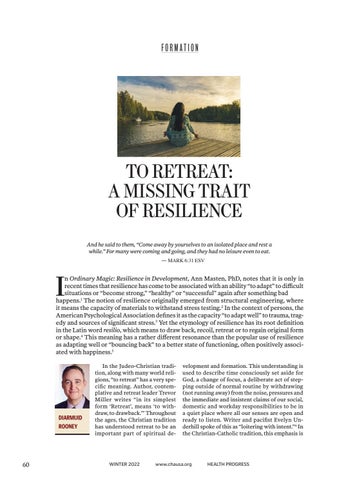FORMATION
TO RETREAT: A MISSING TRAIT OF RESILIENCE And he said to them, “Come away by yourselves to an isolated place and rest a while.” For many were coming and going, and they had no leisure even to eat. — MARK 6:31 ESV
I
n Ordinary Magic: Resilience in Development, Ann Masten, PhD, notes that it is only in recent times that resilience has come to be associated with an ability “to adapt” to difficult situations or “become strong,” “healthy” or “successful” again after something bad happens.1 The notion of resilience originally emerged from structural engineering, where it means the capacity of materials to withstand stress testing.2 In the context of persons, the American Psychological Association defines it as the capacity “to adapt well” to trauma, tragedy and sources of significant stress.3 Yet the etymology of resilience has its root definition in the Latin word resilio, which means to draw back, recoil, retreat or to regain original form or shape.4 This meaning has a rather different resonance than the popular use of resilience as adapting well or “bouncing back” to a better state of functioning, often positively associated with happiness.5
DIARMUID ROONEY
60
In the Judeo-Christian tradition, along with many world religions, “to retreat” has a very specific meaning. Author, contemplative and retreat leader Trevor Miller writes “in its simplest form ‘Retreat’, means ‘to withdraw, to drawback.’” Throughout the ages, the Christian tradition has understood retreat to be an important part of spiritual de-
WINTER 2022
velopment and formation. This understanding is used to describe time consciously set aside for God, a change of focus, a deliberate act of stepping outside of normal routine by withdrawing (not running away) from the noise, pressures and the immediate and insistent claims of our social, domestic and workday responsibilities to be in a quiet place where all our senses are open and ready to listen. Writer and pacifist Evelyn Underhill spoke of this as “loitering with intent.”6 In the Christian-Catholic tradition, this emphasis is
www.chausa.org
HEALTH PROGRESS
